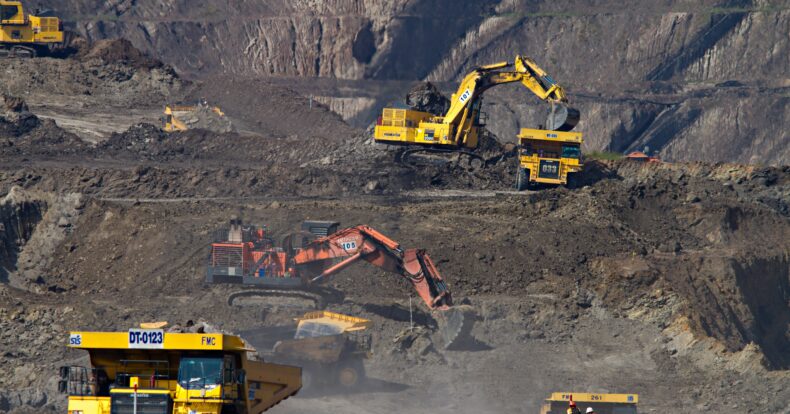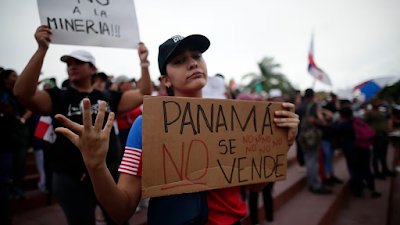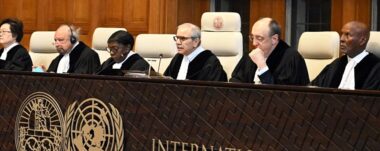Unconstitutionality of mining contract law in Panama

We share the text written by Professor Nicolás Boeglin, from the Law School of the University of Costa Rica. Original title: “A propósito de la declaratoria de inconstitucionalidad por parte de la Corte Suprema de Justicia de Panamá de una ley-contrato minero” (Regarding the declaration of unconstitutionality by the Supreme Court of Justice of Panama of a mining contract law).
On November 27, the Panamanian Supreme Court of Justice declared unconstitutional the law adopted by the Panamanian Legislative Branch approving a contract granting a Canadian mining company copper exploration and exploitation rights in Panamanian territory (see BBC article and article by ElPaís, Spain).
The case goes back to a previous mining concession granted in 1997, and already declared unconstitutional by the same Panamanian justice in a judgment of December 21, 2017: see the opinion text of the Panama Administration Attorney’s Office of May 2021, and the text of the decree of December 19, 2022 adopted by the Panamanian environmental authorities.
Since 2014, a report on the negative impact of Canadian mining companies in Latin America has been waiting for Canadian authorities to take action to regulate their activities from Canada, particularly from the perspective of human rights and environmental protection (Note 1).

The verdict of November 27, 2023 in (very) brief
In a long sentence (see full text), the nine members of the Supreme Court unanimously declared the law approved in October 2023 unconstitutional.
The magistrates indicate that the Panamanian State must establish priorities, which its authorities apparently ignore, when they emphatically point out (p. 111):
Por lo que, en esa línea de pensamiento, mal podría el Estado sobreponer los intereses económicos frente a la protección de derechos humanos. En ese tenor, si bien la República de Panamá, se ha constituido en parte del Tratado de Libre Comercio y del Tratado Bilateral de Inversión con el Estado Canadiense, al generarse la colisión de derechos económicos frente a derechos que se vinculan a la protección del derecho a la salud y a la vida, el Estado necesariamente deberá priorizar éstos últimos.
In this same judgment, in addition to the two international economic instruments referred to by the judges in the previous quote, other international treaties to which Panama is a State Party in environmental matters are also included, in particular one of them: the Escazú Agreement, adopted in Costa Rica in March 2018 and which to date has 15 States Parties, among which Costa Rica is not included (Note 2).
More precisely, we read that (p. 180):
Lo anterior, debe verse en concordancia con lo dispuesto por el Acuerdo Regional sobre el Acceso a la Información, la Participación Pública y el Acceso a la Justicia en Asuntos Ambientales en América Latina y el Caribe (Acuerdo de Escazú), aprobado por la República de Panamá, mediante Ley No 125 de 4 de febrero de 2020, y que dispone en su artículo séptimo la garantía de propiciar la participación ciudadana en asuntos ambientales de entidad, como lo es por ejemplo, el proyecto de minería que en esta ocasión fue elevado a Contrato Ley. Por ser signatarios del referido acuerdo, y en acatamiento del artículo 4, concordante con el artículo 17, ambos de la Constitución Política, el Estado adquirió obligaciones internacionales, de índole social y ambiental, con la finalidad de asegurar a la ciudadanía, la efectividad del derecho al acceso de la información, sobre aquellos asuntos que puedan afectar el libre disfrute de su derecho a un medio ambiente sano, como derechos fundamentales, y dada su incidencia en la dignidad de las personas.
The Panamanian magistrates also indicate (pp. 181-182) that:
Es decir que, al tiempo en que se dieron las discusiones legislativas, que concluyeron con la aprobación del Contrato Ley No406 de 20 de octubre de 2023, existían pautas normativas, dentro de la legislación panameña, que contemplaban mecanismos efectivos para poner en conocimiento de los habitantes de las comunidades aledañas; y de la población en general, toda la información relacionada con las consecuencias y efectos de la actividad minera que se realizó, que se encontraban realizando, y que se iba a realizar, en virtud del Contrato Ley. No obstante, lo verificable es que la concesión minera fue aprobada sobre la base de un informe de impacto ambiental; el cual, además de no ser reciente, y por ende, no contener información actualizada sobre la situación ecológica vigente al momento de su celebración, omite cumplir la normativa reglamentaria emitida por el Estado, con el objetivo de brindar efectividad al derecho de acceso a la información, en materia de asuntos ambientales, suscrito a través del Acuerdo Regional sobre el Acceso a la Información, la Participación Pública y el Acceso a la Justicia en Asuntos Ambientales en América Latina y el Caribe (Acuerdo de Escazú).
As can be seen, the speed with which the approval of this law was processed completely ignored one of the most basic principles of contemporary environmental law, which is included in Panamanian environmental legislation itself: the principle of citizen participation in environmental matters.
Mining companies and political authorities: a strange feeling of “déjà vu”
This ruling puts an end to more than a month of protests and demonstrations by various sectors of Panamanian society, who took to the streets from their homes to protest the peculiar way in which this controversial law was passed: it was an “express” approval on Friday, October 20, 2023 and whose authors possibly intended it to pass almost unnoticed (see note from Semanario Universidad of the same October 20, specifying that the vote was 44 in favor, 5 against and 2 abstentions).
To the aforementioned expeditious procedure, we must add the profound indignation of the Panamanian population at the (no less peculiar) attitude of the highest Panamanian authorities in defending this mining project against all odds: a strange sensation of company-authorities unison that we may qualify as “shameless symbiosis” in relation to a questioned mining project of a Canadian mining company in Costa Rica (Note 3).
Mining contract law Panama
In the text of the aforementioned ruling of the Supreme Court of Justice of Panama, the deep annoyance of its magistrates with the manner in which this mining contract was negotiated is evident, reading in particular that (p. 171):
Constituye una afrenta a la separación de poderes que, ante una declaratoria de inconstitucionalidad de esta Máxima Corporación de Justicia, se haya negociado un contrato de concesión incurriendo en los mismos yerros; y llama la atención el hecho que en el nuevo contrato convertido en Ley No 406 de 20 de octubre de 2023, incluso se mencione el contrato anterior, como si la Sentencia de Inconstitucionalidad no hubiese sido dictada.
The “express” processing of a law observed in Panama is reminiscent of another “accelerated” processing in 2007-2008 of the mining project located in Las Crucitas, in the Northern Zone of Costa Rica: as will be recalled, this mining project was declared “of national convenience” in an unconsulted and surprising manner by the Costa Rican Executive Branch on Friday, October 17, 2008, and … was declared totally illegal by the Costa Rican justice in November 2010. We refer our esteemed readers to the complete judgment of the Contentious Administrative Court of November 24, 2010, which reads (point XL) that:
En relación con este punto, es necesario indicar que en el presente caso ocurre algo excepcional y es que las distintas ilegalidades detectadas y las nulidades declaradas, son todas coincidentes en el sentido de que tendían a la aprobación del proyecto minero Crucitas y varias de ellas se dictaron estando vigente un decreto ejecutivo de moratoria de la minería metálica de oro a cielo abierto, todo lo cual hace viable pensar como posible una eventual concurrencia u orquestación de voluntades para llevar adelante, de cualquier manera, este proyecto minero.
Mining contract law Panama
This first decision was later ratified in its entirety by the First Chamber of the Supreme Court of Justice of Costa Rica on November 30, 2011, when it rejected the battery of arguments presented by the Canadian mining company (see full text of judgment 1469-2011 of the First Chamber, which is of great interest to read).
It is noteworthy that the reversal of the burden of proof in environmental matters alleged by the appellant in its appeal and rejected by the First Chamber (paragraphs XIX and XX of the judgment of the First Chamber) denotes the ignorance of this principle – something basic – and its legal reality in Costa Rica; an ignorance that extended to some members of the Constitutional Chamber, when they analyzed in 2020 the scope of the provisions of the Escazú Agreement, in particular a judge who was a member of the Costa Rican Constitutional Chamber until 2021.
In conclusion
With this decision of its magistrates, Panama offers Latin America and the world in general, a new and exemplary struggle, undertaken by various social sectors, outraged by the peculiar treatment given by its highest political authorities to a foreign company. Despite the peaceful nature of the social protests, four people lost their lives during the various street demonstrations (see article in La Estrella of 8/11/2023).
This decision by the Panamanian judiciary also confirms the independence of the Panamanian judiciary, which in other parts of the continent is often seriously questioned when it comes to mega-projects of a certain size involving foreign investors: in Costa Rica, to the real company-authorities “conspiracy” denounced during a hearing in 2009 in the Constitutional Chamber in relation to the Infinito Gold mining project (see the headline of this article in the Semanario Universidad of November 18, 2009), were added other strange attitudes of its constitutional magistrates, reviewed in the documentary “El Oro de los Tontos” (Fool’s Gold) (see link), and which we allowed ourselves to mention in November 2011 in an article entitled “De cruces, cruzadas y Crucitas” (Of crosses, crusade and Crucitas) (see text published in La Nación).
Mining contract law Panama
In the specific case of Central America, the attitude of the Panamanian political authorities is reminiscent of what has been observed in many environmental scandals arising from contracts with Canadian mining companies: three days after this ruling was handed down, the Panamanian Minister of Trade and Industry resigned (see DW article).
As part of the Canadian company’s strategy (reminiscent of that of another Canadian company in Costa Rica in 2010), the company announced, a few days before the Panamanian court decision was announced, its intention to sue Panama before the International Centre for Settlement of Disputes between Foreign Investors and States (better known as ICSID in English): see the text of the official communiqué of the Panamanian trade authorities dated November 26.
Text shared by Nicolás Boeglin, Professor of International Public Law, School of Law, University of Costa Rica (UCR). Contact: [email protected]
Notes
Note 1: See in this regard the report entitled “El impacto de la minería canadiense en América Latina y la responsabilidad de Canadá – Informe presentado a la Comisión Interamericana de Derechos Humanos” (The Impact of Canadian Mining in Latin America and Canada’s Responsibility – Report submitted to the Inter-American Commission on Human Rights), Working Group on Mining and Human Rights in Latin America, 2014. Full text available here.
Note 2: The status of signatures and ratifications of the Escazú Agreement is available at this official UN link. Regarding Costa Rica’s persistent absence, see BOEGLIN N., “Costa Rica y el Acuerdo de Escazú: historia de una persistente ausencia” (Costa Rica and the Escazú Agreement: history of a persistent absence), Revista de Ciencias Ambientales, Universidad Nacional (UNA), Vol. 58 (2024). Text available here. It should be recalled that since 1998, the European continent has had a regional instrument very similar to the Escazú Agreement, the Aarhus Convention, adopted in 1998 (see official status of signatures and ratifications).
Note 3: See BOEGLIN N.,”Infinito Gold contra Costa Rica: el reciente laudo arbitral del CIADI sobre el proyecto minero ubicado en Las Crucitas” (Infinito Gold v. Costa Rica: the recent ICSID arbitration award on the mining project located in Las Crucitas), Portal of the University of Costa Rica (UCR), edition of 06/15/2021. Text available here. The level of occurrence reached in the Costa Rican Executive Branch from 2006-2010 was captured in the documentary “El Oro de los Tontos” (Fool’s Gold), produced by a talented team from the University of Costa Rica (UCR), as well as in this issue of the Revista Ambientico of February 2009 (Universidad Nacional), titled “¿Minería de oro a cielo abierto … en Crucitas?” (Open-pit gold mining … in Crucitas?).
Mining contract law Panama
It is not superfluous to refer to the report made by an Interdisciplinary Commission of the University Council of the UCR (see full text) warning of the serious weaknesses of the “technical” studies presented by the Infinito Gold company and approved with great levity by the Costa Rican authorities. The firm position of the UCR gave rise to an attempt by the Canadian company to disqualify the contents of this report: see pronouncement of the University Council of June 10, 2009 refuting the smear campaign against it carried out by the Canadian company.
Finally, the lightness with which five of the seven constitutional judges examined the case gave rise to a courageous denunciation by a SENARA official: see article in Semanario Universidad entitled “Piden a Sala IV rectificar fallo sobre minería en Crucitas” (Court IV is asked to rectify ruling on mining in Crucitas) of May 12, 2010. Regarding the questionable (and challenged) decision of the constitutional judge of April 2010, we recommend reading the dissenting opinion of Justice Fernando Cruz and the dissenting opinion of Justice Gilbert Armijo located at the end of the Constitutional Chamber’s vote 06922 – 2010.
Navigate articles



